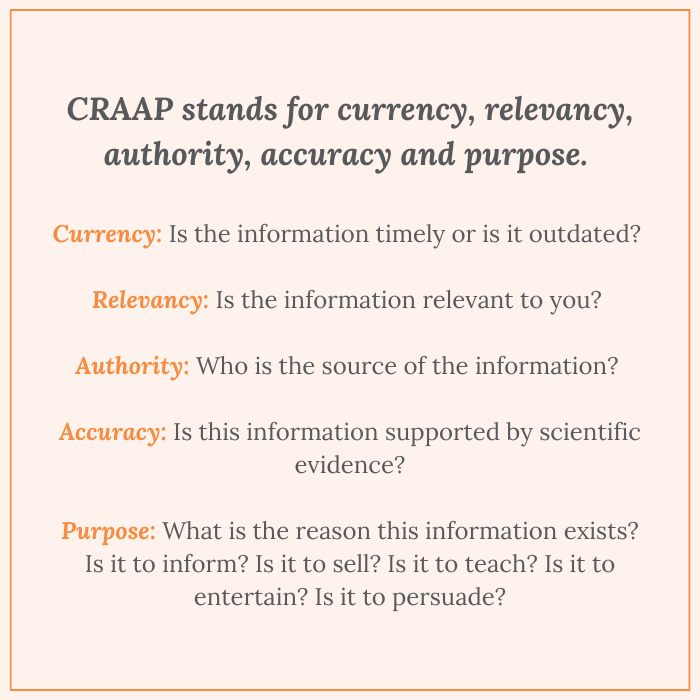When ‘Expert’ Advice Is Unhelpful: A Guide to Avoiding Misleading Social Media Advice on PFD
Published by Feeding Matters on Jul 17, 2023
The pitfalls of unhelpful and misleading social media advice for clinicians and caregivers and how to avoid them
Whether you’re a clinician or a caregiver, unhelpful and inaccurate content is a common pitfall for anyone following feeding therapy accounts on social media. Here’s an example that speech therapist Bri Miluk, MS, MS, CCC-SLP, CLC, owner of Pediatric Feeding Therapy, sees often.
 A therapist with a few years of experience shares a Reel highlighting the “dangers” of using a sippy cup. With a flashy video and a viral song, the account owner warns the audience of all the negative ways a sippy cup can affect speech, feeding, swallowing and sleep. Then, instead of sippy cups, the post recommends a special straw or open cup. The author shares a link to where you can buy it and the hashtag “#ad” as well.
A therapist with a few years of experience shares a Reel highlighting the “dangers” of using a sippy cup. With a flashy video and a viral song, the account owner warns the audience of all the negative ways a sippy cup can affect speech, feeding, swallowing and sleep. Then, instead of sippy cups, the post recommends a special straw or open cup. The author shares a link to where you can buy it and the hashtag “#ad” as well.
Not only is the information, at best, misleading, and, at worst, entirely inaccurate, but it also violates Federal Trade Commision (FTC) rules for advertising.
Miluk, who is pursuing a PhD in communication and information sciences through the University of Alabama, explains, “This kind of content uses fear-mongering to convince people to avoid something based on baseless claims.” Pointing out that there’s no evidence to show that a child using a sippy cup is going to have sleep, airway, feeding or speech difficulties, she goes on to say, “A sippy cup uses similar oral motor patterns as sucking on a pacifier, thumb or bottle, but we know that frequency and duration matter. A child doesn’t have a sippy cup in their mouth all day long.”
Social media is a powerful tool for education and community among caregivers and clinicians alike. But the onus is on the user to ensure the information obtained there is accurate and helpful.
Healthcare misinformation mixed with fear-mongering on social media makes a recipe for disaster
Richard Noel, MD
, a pediatric gastroenterologist at Duke Health, has treated hundreds of patients with pediatric feeding disorder (PFD) and other pediatric GI issues. One problem he hears from caregivers gathering PFD information from social media is that content typically features only one perspective. “On social media, you only see the numerator but never see the denominator. You’re not told about when an approach fails. They always generally talk about their successes.”When information is shared as a general recommendation, it can be particularly challenging. “Pediatric feeding disorder can have many different forms and severities. What works for one person may not work for another,” says Dr. Noel.
Knowing that social media can be full of inaccurate information and even fear-mongering has led clinicians like Miluk to spend time creating social media educational content. Miluk has built up an audience of over 24K on Instagram with content to educate clinicians about feeding therapy. Caregivers also follow her for tips, and Miluk is especially driven to dispel myths for both audiences.
Here’s a great example of how Miluk does this:
https://www.instagram.com/p/CuQO6cCOd-S/Clinicians need to gauge content on misleading social media advice
Even clinicians and students pursuing a therapy degree can fall prey to misinformation on social media. Miluk started sharing social media content, primarily on Instagram, after seeing other speech therapists promote inaccurate or misleading content. She started in 2020 by sharing evidence-based content on pediatric feeding. That evolved to trying to support clinicians and caregivers to better understand dark marketing and how misinformation is shared online. According to Business Review at Berkeley, dark marketing is highly targeted advertising that “causes the audience to think about the product more subtly.”
TikTok posts and Instagram Reels from influencers promoting a product take dark marketing to a new level. “Some of these sources are selling a method or a booklet, and you’re getting advertising disguised as a documentary,” warns Dr. Noel.
Because dark marketing is so pervasive on social media, Miluk teaches her students in university courses and clinicians online how to spot it.
“The better understanding we have of how to be informed consumers ultimately leads to better patient care,” she says.
Judging the accuracy of information on social media

When using social media to view healthcare information, one tool Miluk recommends considering is the aptly-named CRAAP test.
CRAAP
stands for currency, relevancy, authority, accuracy and purpose. Miluk explains each letter of the acronym as follows:Currency: Is the information timely or is it outdated?
Relevancy: Is the information relevant to you?
Authority: Who is the source of the information?
Accuracy: Is this information supported by scientific evidence?
Purpose: What is the reason this information exists? Is it to inform? Is it to sell? Is it to teach? Is it to entertain? Is it to persuade?
Best practices for clinicians using social media for pediatric feeding disorder information
Miluk and Dr. Noel recommend the following ways to access informative PFD content on social media without being misled.
Just because it’s a common refrain doesn’t make it gospelOne of Miluk’s favorite podcasts, Duped by Dr. Michelle Mazur and Maggie Patterson, has a quote she repeats often: Just because you hear something frequently doesn’t mean it’s true.
“Because of cognitive biases, when we see something repeatedly, it’s natural for our brains to believe it to be true. In reality, that doesn’t mean truthfulness,” says Miluk.
Make your intentions clearFor clinicians who promote products on social media, you need to disclose any affiliations in the post. This can’t be simply including #ad. You must clearly state that you may receive a commission on qualifying purchases. “It’s something that I wish would be normalized. An affiliation is not something to be embarrassed about. People have a right to know if you have a potential bias for something when you’re earning a profit, no matter how small,” says Miluk.
Clear disclosure on posts is required by social media channels themselves, as well as the Federal Trade Commission.
Unfollow toxic accountsFor those clinicians and caregivers who actively share on social media, one of the biggest challenges is the ability to hide behind a screen. This can create divisiveness and even be shame-inducing. “If you put something on a public forum, you should expect public replies and even public criticism, but that doesn’t mean we should be disrespectful,” Miluk says.
Miluk recommends treating your social media like your digital home. “If I wouldn’t allow someone to walk through my door and talk to me like that. Then they’re not welcome here, either.”
Advice for parents and caregivers
Caregivers should be wary of social media before adopting a new method or following advice to support children with PFD. Dr. Noel recommends the following tips:
Use your therapy provider as a sounding boardWhen you find new health information, bring it to your therapy provider before investing time or money into a specific method, book or video series. “You see something new on social media that looks amazing and promises to help 10 out of 10 kids with a feeding disorder. If you run it by your therapy provider, they might point out it’s not new. It works for some, but it doesn’t work for all. That’s how you get better, more realistic information for your child,” he says.
Seek information and support from advocacy organizationsDr. Noel is a fan of and a critical professional leader for advocacy organizations like Feeding Matters. He says, as a physician, there are many questions he can’t answer because he doesn’t live with the disorder his patients’ families confront every day. Having a peer referral source is crucial. “These advocacy organizations are incredibly valuable to provide for patients’ needs that are way beyond what I do in medicine,” he says.
Technology today is moving faster than your finger can drag down to refresh. Access to this information overload is only as beneficial as the receiver’s level of skepticism. Miluk’s most important advice for using social media to find support for PFD or any other health issue is to slow down. “You have to slow down your thinking and be willing to appraise the information before feeding education on social media can be effective.”
Click here to read a blog
by Miluk on why she recommends clinicians attend Feeding Matter’s annual PFD conference.